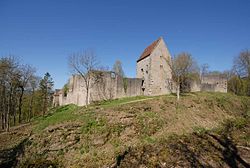Salzburg Castle
| Salzburg Castle | |
|---|---|
| Burg Salzburg | |
| Bad Neustadt an der Saale | |

The Salzburg – northeast side
|
|
| Coordinates | 50°19′14″N 10°13′48″E / 50.3206°N 10.2300°ECoordinates: 50°19′14″N 10°13′48″E / 50.3206°N 10.2300°E |
| Type | hill castle, spur castle |
| Code | DE-BY |
| Height | 300 m above sea level (NN) |
| Site information | |
| Condition | Wholly or mainly preserved |
| Site history | |
| Built | around 1150 |
| Materials | chalk, sandstone |
| Garrison information | |
| Occupants | ministeriales |
Salzburg Castle (German: Burg Salzburg) stands on the edge of a plateau above the town of Bad Neustadt an der Saale in Lower Franconia in southern Germany. The large Ganerbenburg (jointly inherited castle) is still partly occupied today and not all areas are accessible to the public.
The castle was built about a kilometre east of Bad Neustadt on the western end of the plateau above Neuhaus and is separated from the land in front of it by a roughly 160-metre-long neck ditch. Until the 19th century the whole hillside was cleared and was used as early as the High Middle Ages for viticulture. The present, thickly wooded ridge on which the castle stands is also the site of the extensive Franconian Clinic (Rhön-Klinikum AG), which dominates the landscape.
By the Carolingian era, the Salzgau around Neustadt was already very important. An imperial palace (Pfalz) was even built here; it was given to the Bishopric of Wurzburg in 1000 A.D. by Emperor Otto III. This palace was probably on the site of the present village of Salz or in its immediate vicinity. A castle was built on the nearby Veitsberg hill, probably in Ottonian times during the period of the Hungarian invasions, to protect the local populace. A fortified enclosure of unknown date may have been located on the site of the present castle of Salzburg. These fortifications, too, may have been upgraded in the first half of the 10th century into a refuge castle in the face of attacks by the Magyars.
The first record of the Salzburg occurs in a copy of a deed by Emperor Louis the Pious dated around 1160. The original document is missing and could have been inadvertently and mistakenly amended by its scribe, Friar Eberhard of Fulda Abbey, to show the place of publication (Actum-Zeile or Ausstellungsort) as the Salzburg or Salzberg: "Act(um) in Salzb. Curia regia".
...
Wikipedia

